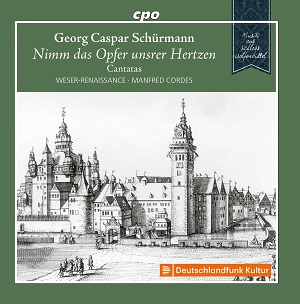Schürmann served the Duke of Brunswick-Wolfenbüttel for 54 years. As court composer, he set a musical standard many aspired to.
The court at Wolfenbüttel Castle had a long tradition of musical excellence. Michael Praetorius had served as Kapellmeister in the 1590s.
When Schürmann arrived in 1707, he inherited a choral and instrumental ensemble of the highest caliber. And he used those resources to great advantage.
The three cantatas presented here show Schürmann at his best. The works are for solo voices only, without choruses. They showcase Schürmann's skill at writing for the human voice.
Each line is beautifully sculpted without being overly florid (a no-no for sacred music in this Protestant court). They also attest to the quality of singers available to the composers.
Some of the arias border on the operatic, which is no surprise. Schürmann wrote over thirty operas (only a few of which survive). His use of dissonance, and delaying resolution to heighten the emotion, works as well in the chapel as it does on stage.
Manfred Cordes and the Weser-Renaissance Bremen perform to their usual high standards. The soloists sing in clean, clear tones with minimal vocal ornamentation. The instrumental ensemble provides the right level of support at all times, even when timpani and brass weigh in.
Schürmann wrote a vast quantity of music, in all types of genres. It's a shame only a small amount of it survived. Based on these three works, I'd like to hear more.
Georg Caspar Schürmann
Nimm das Opfer unsrer Hertzen Cantatas
Weser-Renaissance Bremen; Manfred Cordes, director
CPO 555 374-2

No comments:
Post a Comment